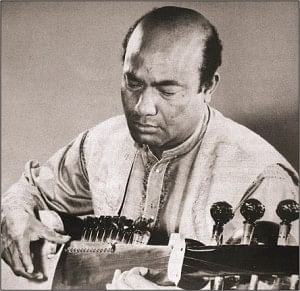Ustad Ali Akbar Khan: A true giver

Sunday June 21, 2009: It was a beautiful afternoon in the 120 acre lush emerald undulating pastures of San Rafael, but almost too quiet. Friends and family have gathered, hearts heavy with the incredible sense of loss at the passing of a star. Ustad Ali Akbar Khan will be laid to rest at the Mt. Tamalpais Cemetery in a few hours. The green meadow of San Rafael will forever be filled with the mellifluous melodies of his raaga creations, "Gauri Manjari," "Lajwanti," "Madhavi" and "Madhu Malati." Can you ever bury a star from the sky?
It was only a few nights ago, on June 17, when he called his students and sons for a lesson, his last. His son Alam Khan says, "We put him in a chair, and he asked us to bring a harmonium. We started playing it, and he began to sing to us.” Sombre candles burned, the room filled with students and family, all weeping at this incredible goodbye the maestro was bidding. His father Baba Alauddin had said, "keep on teaching till you can see the sun and moon." Ustad Ali Akbar Khan did just that.
Prolonged kidney ailments had weakened his body, but not his soul. He had been on dialysis for the last five years. His wife of 30 years, Mary Johnson Khan, has painstakingly preserved the collection of Khansahib's 35 years of recordings and notations, as well as the notebooks maintained by Baba Alauddin Khan in a database that will be accessible through the internet. It is her baby, she says. Mary had trained in 'tabla' and 'kathak' dance at the Ali Akbar Khan College of Music (in San Rafael), some 30 years back.
Sunday, June 21, was observed as Fathers Day around the world, when Khansahib was laid to rest. His son Alam turned 27 the next day. Alam started attending 'sarod' classes when he was seven, survived six classes a week and hours of practice and his own rock band! “From Father to Son” is a wonderful album released in 2002 by Khansahib and Alam playing "Puriya Dhanesri," an evening raaga articulating peace, pathos, joy and power. The recording is a testament of Khansahib's pedagogy as well as the beauty of musical lineage.
“It's like an adult lion teaching a cub the moves” said Khansahib about the rendition, “maybe on the next note, Alam is going to put it wrong, and I am ready, at once I jump there and he gets the idea, he gets the note, and I leave him.” The maestro is survived by 11 children, including the great 'sarod' player Ashish Khan.
Ali Akbar Khan was born in the village of Shibpur, Comilla, in the then East Bengal (now Bangladesh). Soon after his birth, his family returned to Maihar (in present day Madhya Pradesh, India) where his father was the court musician for the Maharaja of the princely state. Khansahib was an ardent lover of ilish fish and rasmalai. His face would light up at their mention. Just like my dad (noted singer and music exponent Mustafa Zaman Abbasi) says, you are not a Bengali, if you don't love fish. Mary Khan confirms the fact that her husband was a wonderful cook -- chicken, fish and lamb being his specialty. Though he would claim that a simple rice and daal would be his forte!
The three Ali Akbar Khan Colleges of Music -- founded in 1956, '67 and '85, respectively, in Kolkata, San Rafael (California) and Basel (Switzerland) -- remain as institutes where music lovers will forever congregate, to keep the flame burning. The students will remember the Ustad as a simple, humble man of exceptional talent. He would arrive at the college early evening around 6 to teach his class -- a mosaic of students from different background, linked by the love of music. During break they would often surround him seated in an upholstered chair, patiently listening to and answering questions of the curious mind. A great listener and a man with a great sense of humour!
Khansahib said, “I love music. Whatever I know, I will share. If you can learn in a day, I'll teach you everything. If you can play better than me, all the better! The better you can play and sing, the more beautifully you can express yourself.” I have always been intrigued by the memorable words of Kahlil Gibran, “All you have shall someday be given; therefore give now, that the season of giving may be yours and not your inheritors.”
My salute to Ustad Ali Akbar Khan, a true giver.

 For all latest news, follow The Daily Star's Google News channel.
For all latest news, follow The Daily Star's Google News channel. 



Comments